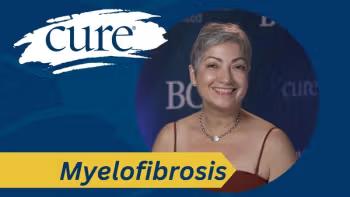
Living Your 'New Normal' with a Myeloproliferative Neoplasm

Transcript:
Kristie L. Kahl: Can you discuss how MPNs have become more of a chronic disease now and what that means for patients?
David Alexander: Really in fact, MPNs always were a chronic disease. In a bygone era, toxic drugs were commonly given which often themselves caused acute leukemia and end-of-life. Thankfully, those days are gone, and the newly diagnosed patients should not get scared when reading about information from those ancient eras. Now we have better advice based on more robust statistics, which prove what patients and long-established online support groups can easily see, that patients’ lifespan and productive years are often measured in decades — in fact, often many decades, especially for those diagnosed before or during middle age.
Kristie L. Kahl: What are the signs that a patient’s disease is under control?
David Alexander: No drugs or treatments have been conclusively shown to affect the mechanism of the progressive disease process. So as to change lifespan disease control may be defined as limiting risks such as recurrent thrombosis, heart attacks, stroke, internal organ thrombosis — which do limit lifespan – and at the same time, maximizing quality of life, minimizing quality of life issues, which may seem to limit life functionality or in any case enjoyment. It's important, as Dr. Mesa mentioned, for patients to work with knowledgeable doctors to keep these realities in perspective.
Kristie L. Kahl: How has quality of life been impacted with MPNs since they are a chronic condition?
David Alexander: Well quality of life has improved with better knowledge about what to treat. Perhaps, hardest for us patients to grasp, it's been improved also by learning about what not to treat. A current example is high platelet count when there is no evidence of platelet malfunction. I like to say that it's tough for us patients to accept that real advances in knowledge sometimes yields confidence of what not to do and that's hard for us patients sometimes because doing something can feel better than doing nothing. But that doesn't necessarily make it true.
Kristie L. Kahl: And so what are examples of long-term treatment options and what patients have to look forward to?
David Alexander: In modern thinking, not treating without purpose is in itself a benefit. As Dr. Mesa mentioned, there are side effects even with the better modern treatments that are coming to the forefront or are here. As you know modern medicines that we already have most prominently at this instant, JAK inhibitors, can yield really important improvements and quality of life in those for whom they work, including me when I took one.
Kristie L. Kahl: What is the best way for patients to learn more about their long-term treatments
David Alexander: Dr. Mesa has already mentioned some of the more common treatment options that some people can use for a long time, including phlebotomy, interferon formulations, JAK inhibitors, spleen reduction, quality of life improvements, as well as more traditional hydroxyurea. Usually one of these currently prescriptible options achieve any needed risk reduction and quality of life improvement. Those who have low instead of high blood counts like red blood counts, erythropoietin substitutes and some other medications can provide important relief, sometimes as a bridge to the only option that's designated curative which is bone marrow transplant.
Kristie L. Kahl: What would you say is the best way for patients to learn more or become better educated about their treatment options?
David Alexander: Well of course everyone looks at the internet but it's important to learn and learn quickly, especially with the relatively rare disease, how to discern reliable information from people who know what they're talking about and who can prove it by letting you know just how they know what they say they know. So that even if you trust, you can verify. The way I like to say it is, in short, you must become an expert.
Kristie L. Kahl: Moreover, how can support groups play a role?
David Alexander: Well online support groups and in-person patient meetings can be very important. In the Internet age, we can find them. No longer do patients with any MPN have to feel alone and that's important to help inform treatment decisions and important for psychological health, which is a critical part of long-term quality of life. Let me add, I'm partial to the oldest and highest quality online MPN support group that I know of. One that I help run it's called MPM Net and can be reached via the link at MPNinfo.org or if you get stuck you can email me at [email protected].
Kristie L. Kahl: To bring it all together what would you say is your biggest piece of advice for a patient with a myeloproliferative neoplasm?
David Alexander: There's a lot out there. I guess I'd summarize by saying, learn what your new normal is. Appreciate it for all it's worth and try looking at it objectively, even as you get to know some of the MPN community to become acquainted with your new normal, don't pretend you're someone else or need to do what may have been appropriate for them. Live your life and live your new normal as they come along. Live your next new normal.
Transcription edited for clarity.




